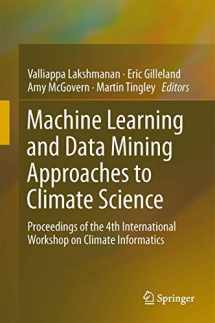
Machine Learning and Data Mining Approaches to Climate Science: Proceedings of the 4th International Workshop on Climate Informatics
Book details
Summary
Description
This book presents innovative work in Climate Informatics, a new field that reflects the application of data mining methods to climate science, and shows where this new and fast growing field is headed. Given its interdisciplinary nature, Climate Informatics offers insights, tools and methods that are increasingly needed in order to understand the climate system, an aspect which in turn has become crucial because of the threat of climate change. There has been a veritable explosion in the amount of data produced by satellites, environmental sensors and climate models that monitor, measure and forecast the earth system. In order to meaningfully pursue knowledge discovery on the basis of such voluminous and diverse datasets, it is necessary to apply machine learning methods, and Climate Informatics lies at the intersection of machine learning and climate science. This book grew out of the fourth workshop on Climate Informatics held in Boulder, Colorado in Sep. 2014.


We would LOVE it if you could help us and other readers by reviewing the book
Book review



